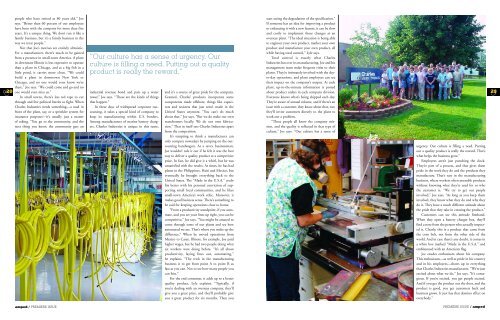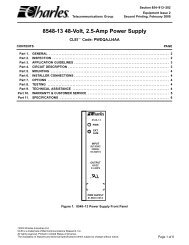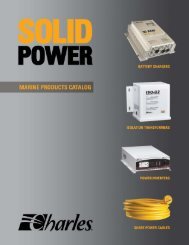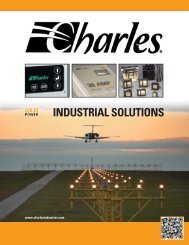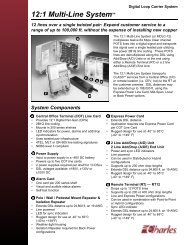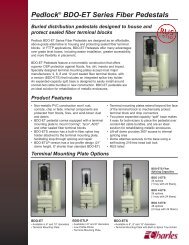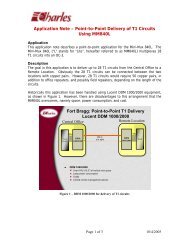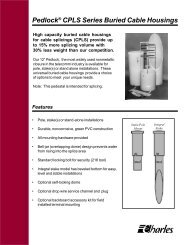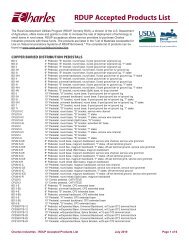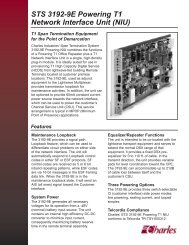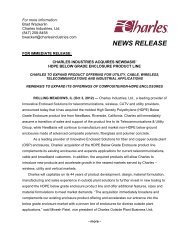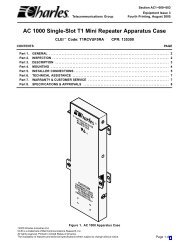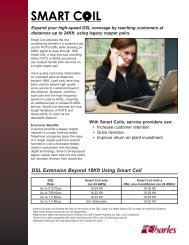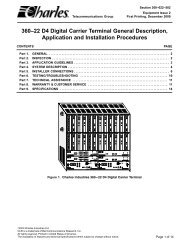solid power for life - Charles Industries, Ltd.
solid power for life - Charles Industries, Ltd.
solid power for life - Charles Industries, Ltd.
You also want an ePaper? Increase the reach of your titles
YUMPU automatically turns print PDFs into web optimized ePapers that Google loves.
20<br />
people who have retired at 80 years old,” Joe<br />
says. “Better than 60 percent of our employees<br />
have been with the company <strong>for</strong> more than five<br />
years. It’s a unique thing. We don’t run it like a<br />
family business, but it’s a family business in the<br />
way we treat people.”<br />
Not that Joe’s motives are entirely altruistic.<br />
For a manufacturer, there’s much to be gained<br />
from a presence in small-town America. A plant<br />
in downstate Illinois is less expensive to operate<br />
than a plant in Chicago, and as a big fish in a<br />
little pond, it carries more clout. “We could<br />
build a plant in downtown New York or<br />
Chicago, and no one would even know we’re<br />
there,” Joe says. “We could come and go and no<br />
one would even miss us.”<br />
In small towns, there’s less red tape to cut<br />
through and few political battles to fight. When<br />
<strong>Charles</strong> <strong>Industries</strong> needs something—a road in<br />
front of the plant, say, or a sprinkler system <strong>for</strong><br />
insurance purposes—it’s usually just a matter<br />
of asking. “You go to the community, and the<br />
next thing you know, the community gets an<br />
“Our culture has a sense of urgency. Our<br />
culture is filling a need. Putting out a quality<br />
product is really the reward.”<br />
industrial revenue bond and puts up a water<br />
tower,” Joe says. “Those are the kinds of things<br />
that happen.”<br />
In these days of widespread corporate outsourcing,<br />
it takes a special kind of company to<br />
keep its manufacturing within U.S. borders.<br />
Among manufacturers of marine battery chargers,<br />
<strong>Charles</strong> <strong>Industries</strong> is unique in this sense,<br />
and it’s a source of great pride <strong>for</strong> the company.<br />
Granted, <strong>Charles</strong>’ products incorporate some<br />
components made offshore, things like capacitors<br />
and resistors that just aren’t made in the<br />
United States anymore. “You can’t do much<br />
about that,” Joe says. “But we do make our own<br />
trans<strong>for</strong>mers locally. We do our own fabrication.”<br />
That in itself sets <strong>Charles</strong> <strong>Industries</strong> apart<br />
from the competition.<br />
It’s tempting to think a manufacturer can<br />
only compete nowadays by jumping on the outsourcing<br />
bandwagon. As a savvy businessman,<br />
Joe wouldn’t rule it out if he felt it was the best<br />
way to deliver a quality product at a competitive<br />
price. In fact, he did give it a whirl, but he was<br />
unsatisfied with the results. At times, he has had<br />
plants in the Philippines, Haiti and Mexico, but<br />
eventually he brought everything back to the<br />
United States. The “Made in the U.S.A.” credo<br />
fits better with his personal conviction of supporting<br />
small local communities, and he likes<br />
small-town America’s work ethic. Moreover, it<br />
makes good business sense. There’s something to<br />
be said <strong>for</strong> keeping operations close to home.<br />
“From a productivity standpoint, if you automate,<br />
and you set your lines up right, you can be<br />
competitive,” Joe says. “You might be amazed to<br />
come through some of our plants and see how<br />
automated we are. That’s where you make up the<br />
difference.” When he moved operations from<br />
Mexico to Casey, Illinois, <strong>for</strong> example, Joe paid<br />
higher wages, but he had two people doing what<br />
six workers were doing be<strong>for</strong>e. “It’s all about<br />
productivity, laying lines out, automating,”<br />
he explains. “The trick in the manufacturing<br />
business it to get from point A to point B as<br />
fast as you can. Not to see how many people you<br />
can hire.”<br />
For the end consumer, it adds up to a better<br />
quality product, Lyle explains. “Typically, if<br />
you’re dealing with an overseas company, they’ll<br />
give you a great price, and they’ll probably give<br />
you a great product <strong>for</strong> six months. Then you<br />
start seeing the degradation of the specification.”<br />
If someone has an idea <strong>for</strong> improving a product<br />
or enhancing it with a new feature, it can be slow<br />
and costly to implement those changes at an<br />
overseas plant. “The ideal situation is being able<br />
to engineer your own product, market your own<br />
product and manufacture your own product, all<br />
while having total control,” Lyle says.<br />
Total control is exactly what <strong>Charles</strong><br />
<strong>Industries</strong> has over its manufacturing. Joe and his<br />
management team make frequent visits to their<br />
plants. They’re intimately involved with the dayto-day<br />
operations, and plant employees can see<br />
their impact on the company’s output. At each<br />
plant, up-to-the-minute in<strong>for</strong>mation is posted<br />
about product orders in each company division.<br />
Everyone knows what’s being shipped each day.<br />
They’re aware of annual volume, and if there’s an<br />
issue with a customer, they know about that, too;<br />
they’ll invite customers directly to the plant to<br />
work out a problem.<br />
“These people all know the company mission,<br />
and the quality is reflected in that type of<br />
culture,” Joe says. “Our culture has a sense of<br />
urgency. Our culture is filling a need. Putting<br />
out a quality product is really the reward. That’s<br />
what helps the business grow.”<br />
Employees aren’t just punching the clock.<br />
They’re part of a process, and that gives them<br />
pride in the work they do and the products they<br />
manufacture. That’s rare in the manufacturing<br />
business, where workers often assemble products<br />
without knowing what they’re used <strong>for</strong> or who<br />
the customer is. “We try to get our people<br />
involved,” Joe says. “As long as you keep them<br />
involved, they know what they do and why they<br />
do it. They have a much different attitude about<br />
the pride that they take in creating the product.”<br />
Customers can see this attitude firsthand.<br />
When they open a battery charger box, they’ll<br />
find a note from the person who actually inspected<br />
it. Clearly, this is a product that came from<br />
the corn belt, not from the other side of the<br />
world. And in case there’s any doubt, it comes in<br />
a white box marked “Made in the U.S.A.” and<br />
emblazoned with an American flag.<br />
Joe exudes enthusiasm about his company.<br />
This enthusiasm—as well as pride in his country<br />
and in his employees—shows up in everything<br />
that <strong>Charles</strong> <strong>Industries</strong> manufactures. “We’re just<br />
excited about what we do,” Joe says. “It’s contagious.<br />
If you’re excited, you get people excited.<br />
And if you get the product out the door, and the<br />
product is good, you get customers back and<br />
business grows. It just has that domino effect on<br />
everybody.”<br />
21<br />
amped / PREMIERE ISSUE<br />
PREMIERE ISSUE / amped


